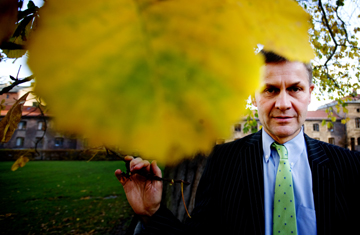
Between climate change, pollution and vanishing fish stocks, you would think that being Environment Minister of a midsize European country would be enough to keep most people busy. But for Norway's Erik Solheim, it's only half his job. The 54-year-old combines his environmental brief with a role as head of his country's Ministry for International Development. And if that seems like an unlikely combination — one part nature preservation, one part economic growth — you don't understand what makes Solheim, or Norwegians, tick. "It makes sense that they'd be united," he says. "One of the great issues of our time is how to adapt to climate change. And everything you do to adapt — whether at home or abroad — is development."
Given his background, Solheim's global vision makes sense. After 11 years in Parliament, he joined Norway's Ministry of Foreign Affairs and became chief mediator in the peace talks between the Sri Lankan government and the Tamil Tigers. The work prepared him for the tricky task of negotiating major international environmental agreements like the Reducing Emissions from Deforestation and Forest Degradation (REDD) program. With deforestation producing nearly a fifth of the world's greenhouse gases, REDD is designed to curb emissions by offering poor nations financial incentives to adopt sustainable management practices for their forests. With Solheim's guidance, Norway has not only helped lead the program, but from a fund of $500 million it has set aside to fight deforestation, it has earmarked $52 million to help get REDD off the ground. "This is lower-hanging fruit," he says. "It's a way to reduce emissions, reduce deforestation and foster the enormous public changes in developing countries. But to do it, they need financial support from rich countries."
The green drive also requires some of that famous Scandinavian pragmatism. By most measures, Norway is one of the greenest countries in Europe. It was the first in the world to build a carbon-capture and storage facility, it levies high taxes on emissions and it has the ambitious goal of not only surpassing its Kyoto obligations but becoming carbon-neutral by 2030. It even prohibits any carmaker — even those who manufacture hybrids — from advertising its product as green, since, in the words of one official, "cars cannot do anything good for the environment."
But Norway also happens to be one of the world's largest exporters of hydrocarbons, which means that while it may cut emissions at home, it makes a huge profit selling one of the chief generators of carbon to other countries. Solheim favors cutting back on hydrocarbon industries while granting more government support to renewables. In the meantime, REDD functions as a sort of atonement. The money that Norway donated to REDD was paid for "with our oil revenues," Solheim notes.